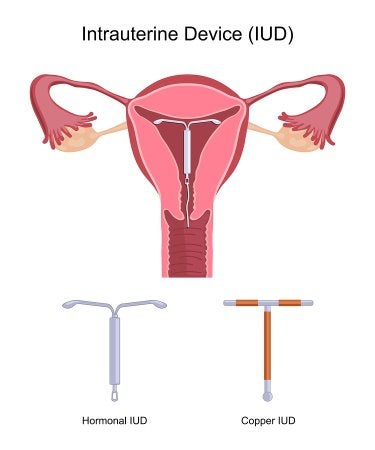-
Why Am I Getting Two Periods Per Month?
Generally, women should get their periods every 21 to 35 days, or every 21 to 45 days during their teenage years. However, it’s possible for periods to come closer together in some cases, including two times in the same four-week period. If this change occurs during your menstrual cycle, consult with your gynecologist . In some cases, having more than one period in a month could indicate an underlying medical condition that needs to be treated. Here is a look at some of the potential causes of experiencing a shorter menstrual cycle.
Thyroid Problems
Your thyroid is a gland in your neck that produces a hormone that is required for a number of different activities in your body. When your thyroid either becomes overactive and produces too much hormone or underactive and produces too little, your menstrual cycle can be affected. If you are having multiple periods in a month, your gynecologist may perform a blood test to check your thyroid levels.

Menopause
At the onset of menopause, it’s common for periods to become irregular before they stop. Often, women will experience heavier periods than normal or have periods that come closer together than they used to. This is especially common in early-onset menopause. If your gynecologist determines that you’re entering menopause, he or she may recommend hormone replacement therapy to ease your symptoms.
Weight Fluctuations
Changes in your weight can have a significant impact on your menstrual cycle. Extreme weight loss or a sudden, extreme increase in weight can both change the length of your menstrual cycle and cause you to experience more than one period in a month. This can also occur as a result of extreme weight loss efforts, such as a sudden, drastic increase in exercising or decrease in calories.
Make an appointment with a gynecologist in Washington, D.C. at Washington Surgi-Clinic if you are experiencing changes in your menstrual cycle. Contact us today to schedule a visit by calling (202) 659-9403.
-
Basic Facts About the Abortion Pill
If you decide to end your pregnancy, a chemical abortion using the so-called abortion pill is one of the options your gynecologist will discuss with you. This method is typically recommended up to the 10 th week of pregnancy, at which point a surgical procedure may be necessary instead.
Watch this video to learn more about the abortion pill. There are actually two medications involved in this kind of first-trimester abortion. You will take the medications at home and will experience bleeding and cramping for up to 24 hours. Approximately a week after the procedure, your gynecologist will perform an exam to ensure the abortion was effective.
At Washington Surgi-Clinic , we’re committed to helping women make informed choices about their health. If you need more information about abortion in Washington, D.C., call us at (202) 659-9403.
-
FAQs and Answers About HIV Testing
Getting tested for HIV is a major step in taking control of your health. Although the idea of testing may be overwhelming, it is actually a simple, confidential process. Your gynecologist can answer all of the questions you have along the way so that you can make the right choices for your own health. Here is a look at some questions patients who are undergoing HIV testing frequently have, so you can arm yourself with the facts.

How is HIV testing done?
HIV testing can be done using a blood sample or oral swab. This sample is tested to see if it contains any antibodies consistent with HIV infection . The amount of time it takes to get test results depends on the kind of testing being performed. In some cases, results are available in as little as 30 minutes, while other tests can take a few weeks to come back. Your gynecologist will discuss the testing method he or she is using with you and tell you what to expect.
Who should get tested?
If you have been sexually active with someone whose HIV status you don’t know, you should consider getting tested. You should also consider getting tested after sharing needles, exchanging sex for money or drugs, or having sex with anyone who has engaged in those behaviors. Being sexually assaulted, having another STD, or having hepatitis or tuberculosis also means you have an increased risk of HIV and should consider getting tested. The Centers for Disease Control and Prevention says that everyone should be tested at least one time. Your gynecologist can help you decide if you should get tested more often.
What happens when I get my test results?
If your results are negative, your gynecologist will discuss safe sex strategies you can use to continue to avoid infection. If your results are positive, after confirming the results with another test, your doctor will discuss your HIV treatment options with you. There are many treatments available today that allow people to live long healthy lives while being HIV positive.
Let Washington Surgi-Clinic guide you through the process of HIV testing and treatment in Washington, D.C. To make an appointment for STD testing or other gynecology services, please call (202) 659-9403.
-
How Effective Are Condoms in Preventing Pregnancy?
To make an informed decision about pregnancy prevention, it’s important to know the effectiveness of different birth control methods. One such method you may wish to discuss with your gynecologist is condoms. Condoms are popular choices for birth control because they don’t require daily use and don’t involve hormones, but are they effective? Here is what you need to know.

Condoms are approximately 98% effective, as long as they are used correctly. Using a sharp object to open the condom wrapper, using an oil-based lubricant, or putting the condom on incorrectly or at the wrong time can all lessen the effectiveness. Unlike some birth control methods, condoms also protect against STDs. Some people choose to use another method, such as birth control pills, in conjunction with condoms in order to prevent both pregnancy and STDs as effectively as possible.
At Washington Surgi-Clinic, we’re here to help you understand your options for birth control as well as your choices for pregnancy termination in Washington, D.C ., should an unwanted pregnancy occur. You can schedule an appointment today by calling (202) 659-9403.
-
What Are Some Signs That You Should Consider a Different Birth Control?
With so many birth control options available, there is no reason to suffer through undesirable side effects or other disruptions that can ultimately interfere with your method’s effectiveness. When you don’t love your birth control method , you’re less likely to use it correctly, which could lead to unwanted pregnancy. If you experience any of these signs that your birth control isn’t working for you, schedule an appointment with your gynecologist to discuss other options that may be better suited to your needs.
You have breakthrough bleeding.
Breakthrough bleeding occurs when you experiencing bleeding outside of menstruation. It’s not uncommon for women to experience a small amount of spotting between periods when they first begin a new birth control pill or other hormonal birth control method. However, if breakthrough bleeding is happening every month, talk to your gynecologist. Using a different pill or other methods of birth control can resolve the bleeding.

You’re feeling nauseous or bloated.
When you are on the wrong mix of hormones for your body, you may experience symptoms of PMS sporadically throughout your cycle. This includes feelings of nausea and bloating that you may be more used to having right before your period. These symptoms are not just part of taking hormonal birth control that you have to accept. See your gynecologist to discuss the symptoms you’re having. A different combination of hormones may work better for you, or you may decide that hormonal birth control is not right for you at all and that you could benefit from copper IUDs or barrier methods instead.
You’re struggling to use it correctly.
Even the most reliable form of birth control can’t deliver results if you don’t use it the right way. If you are having difficulty remembering to take your birth control pills at the right time or use your barrier method correctly, then consider switching to another kind of contraception to reduce your chances of an unwanted pregnancy.
Let Washington Surgi-Clinic help you explore your options birth control methods in Washington, D.C. to find the best solution for your needs. Schedule a consultation with a gynecologist today by calling (202) 659-9403.
-
Preventing Recurring Vaginal Infections
Most women suffer from a vaginal infection at least once in their lives, but when infections happen repeatedly, it’s important to work with your gynecologist to find a way to prevent future outbreaks. Although most vaginal infections do not cause serious long-term health complications, some can be a sign of more serious problems. If you’re experiencing recurring vaginal infections, these tips may help you get the treatment you need to avoid future flare-ups.

Get the Right Diagnosis
In some cases, women attempt to treat their vaginal infections at home, only to find that the infection keeps coming back after treatment stops. When this happens, it is usually because they are using the wrong treatment for the infection they have. For example, bacterial vaginosis, or BV, is an extremely common infection that shares symptoms with yeast infections. Women who have BV may assume that they have a yeast infection and use over-the-counter yeast infection medications for treatment, only to find that the symptoms return. When you have a vaginal infection, see your gynecologist for a definitive diagnosis, so that you get the right treatment the first time.
Consider Underlying Conditions
In some cases, recurrent vaginal infections can indicate an underlying medical condition that needs to be treated. Undiagnosed or uncontrolled diabetes, for instance, is associated with recurring yeast infections, as elevated blood glucose levels can upset the balance of yeast and bacteria in the vagina. STDs can also cause vaginal infections. If you have recurring infections, talk to your doctor about STD testing and other kinds of screenings you may need. Treating the underlying condition can resolve your recurring infections.
Practice Safe Sex
If you have a vaginal infection, you can transfer your infection to your partner during sexual intercourse. Your partner can then transfer the infection back to you. To break this cycle, avoid sexual intercourse until you are better, or ask your gynecologist if using a condom will protect your partner from infection.
Take control of your sexual health today with gynecology services in Washington, D.C . at Washington Surgi-Clinic. From STD testing and Pap smears to birth control counseling and pregnancy termination, we offer comprehensive women’s health services with a focus on patient confidentiality. To find out more about our services or to make an appointment, call (202) 659-9403.
-
Staying Comfortable During Your Pregnancy Termination
When you go to the clinic for a pregnancy termination procedure, the gynecologist will provide pain management care to keep you comfortable. Discuss any previous reactions you may have had to pain medicine in the past, and let your doctor know which medications you’re already taking. To keep you relaxed and comfortable during a second trimester abortion, a certified nurse anesthetist will administer anesthesia.

You can choose which type of anesthesia you wish to have. You may have local anesthesia, which only numbs the immediate area. Conscious sedation will relax your whole body, but it won’t make you fall asleep. General anesthesia is the deepest level, as it allows you to sleep through the procedure. You’ll be closely monitored for safety the entire time you’re asleep.
There are several options for pain management when you have an abortion in Washington, D.C. Call Washington Surgi-Clinic at (202) 659-9403 to request a consult for pregnancy termination.
-
When to Talk to Your Doctor About Period Pains
Most women experience mild, fleeting menstrual cramps every month. If you’re having severe pain that isn’t manageable with over-the-counter medications, it’s time to see your gynecologist. You should also see your doctor if your period lasts any longer than seven days, or if bleeding is heavy enough to require a new tampon or sanitary pad every hour. Several treatment options are available, including hormonal birth control pills.
When you watch this video, you’ll meet Donna. For years, Donna lived with excruciating menstrual pain and abnormally heavy bleeding. She was finally diagnosed with uterine fibroids, endometriosis, and adenomyosis. After having a hysterectomy, Donna feels like a new woman.
Women who have gynecology concerns and live near Washington, D.C. will find warm, trusted healthcare providers at Washington Surgi-Clinic. Call (202) 659-9403 to request our next available appointment with a gynecologist .
-
What to Consider Before Choosing the IUD for Birth Control
Intrauterine devices (IUDs) are a birth control method that’s become quite popular lately. Some women decide it’s the right choice for them because it’s low-maintenance—there’s no need to take a monthly trip to the pharmacy, or to remember to take a pill every day. However, an IUD isn’t necessarily right for every woman. Talk to a gynecologist about your options and your health history before deciding.

There are several IUDs.
Today, women have more IUD options available in the U.S. than in previous years. There are now at least four approved hormonal IUDs, plus one non-hormonal IUD. The hormonal IUDs work because of the time-controlled release of progestin, which is a synthetic version of progesterone—a hormone naturally made by the body. Depending on the brand of IUD you choose, the hormonal options can remain in place and stay effective for three to six years. The non-hormonal IUD is made with a little copper, which prevents sperm from fertilizing an egg. The copper IUD can remain effective for up to 12 years.
IUD insertion can be unpleasant.
Your gynecologist must insert the IUD—it cannot be inserted or removed at home. The doctor will make you as comfortable as possible during the insertion process, however, you should expect some discomfort. Initially, the insertion will feel much like a typical pelvic exam and pap test. The gynecologist will insert a speculum, followed by a long, skinny tube that holds the IUD. This must be inserted through the cervix and into the uterus. Although the experience may not be pleasant, it should be over within just a few minutes.
The adjustment period can last a couple of months.
Once your body has adjusted to the IUD’s presence, you shouldn’t notice anything different, except that you might eventually not have your period anymore. However, during the adjustment process, you may feel bloated, crampy, and occasionally nauseated.
At Washington Surgi-Clinic , we value and respect the unique needs of every woman we care for. Call (202) 659-9403 for an appointment, and one of our gynecologists will take the time to discuss your birth control options at length. If you choose to have an IUD inserted at our Washington, D.C. clinic, you can rest assured your gynecologist will exercise care to ensure your safety and comfort.
-
FAQs About Birth Control and STD Prevention
It’s often said that the only foolproof way of avoiding an unwanted pregnancy and sexually transmitted diseases (STDs) is sexual abstinence. But since lifelong abstinence isn’t always practical, and women have a high risk of being sexually assaulted at some point, it’s also important to know the basics of gynecology care. Every woman should build a relationship with a trusted gynecologist with whom they feel comfortable discussing sensitive issues.

Is it possible for condoms to fail?
Aside from sexual abstinence, the barrier method is the only way to prevent both STDs and unintentional pregnancies. Even condoms can fail, unfortunately. Using condoms correctly (including during oral sex), and using only latex condoms will improve the effectiveness of the barrier method. Some individuals have latex allergies, and may choose lamb skin condoms instead. Know that this type does not protect against HIV infection. Additionally, follow these tips:
- Never use expired condoms.
- Avoid using condoms that were stored in a wallet, car, or in extreme temperatures.
- Don’t use teeth or fingernails to rip open condom packaging.
- Use a new condom for each vaginal, oral, and anal sex act.
Can I get vaccinated against STDs?
There are vaccines available to protect individuals from certain STDs . One of them, the HPV vaccine, can even protect women and men from cervical and oropharyngeal cancers caused by human papillomavirus. Vaccines are also available to prevent hepatitis A and B. Talk to your doctor if you’re unsure of whether you’ve received these vaccines. Remember that you’ll still have to use protection to prevent unintentional pregnancy and other STDs.
What are my options if I’m sexually assaulted?
Unfortunately, sexual assault and rape are far more common than many people realize. The best course of action is to call the police and get to an emergency room, where a doctor can do a rape kit in case you decide to press charges. However, many women choose not to report the assault right away. You should still see your gynecologist as soon as possible, even if you aren’t sure whether you want to get the police involved. Your gynecologist respects patient confidentiality, and can give you the morning after pill to protect you from pregnancy. The doctor can also test and treat you for STDs.
Bring your gynecology questions with you when you arrive for an appointment at Washington Surgi-Clinic. Our gynecologists in Washington, D.C. firmly believe in the importance of patient education and proactive self-advocacy . You can get in touch with a friendly staff member at (202) 659-9403.
Recent Posts
Popular Posts
categories
- Uncategorized
- STD
- Washington Surgi-Clinic
- Abortion
- Pregnancy
- Pap Smears
- Birth Control Options
- HPV
- Gynecologist
- Pregnancy Test
- Abortion Safety
- IUD
- Pregnancy Termination
- First Trimister
- Cervical Cancer
- Morning After Pill
- Birth Control Pills
- Chlamydia
- Birth Control Shot
- Gonorrhea
- STD Testing
- Birth Control Implant
- Pelvic Pain
- Birth Control Patch
- HIV
- HPV Vaccine
